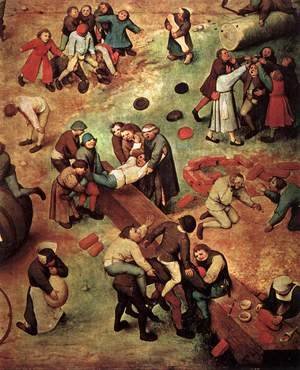
Here is an image of the kingdom of heaven.
There was a man who sowed his field with clean seed; but while all the world
was asleep, an enemy of his came and scattered tares among the wheat, and was
gone.
When the Creator formed the world in the beginning he put in it only what was
good, and all that he created was good. It is the enemy who has introduced the
germs of evil into the world, for evil does not come from the Creator.
An enemy of his came and scattered tares
among the wheat, and was gone. The devil uses all his power to make us fall, but
after the fall, he abandons us. What he loves is not man but the ruin of man.
He rejoices in our misfortune, takes pride in our ruin, gloats over our wounds:
he is only thirsty for our blood, hungry for our flesh: he only lives for our
destruction. The devil does not wish to gain men, he wishes to ruin them, for
he cannot wish, nor permit, nor endure, that they should reach the heaven from
which he fell.
But his spite does not lack folly. What does our
enemy do here? He comes while all the world is asleep. The servants are
sound asleep: but does the Master sleep? It is in vain that the enemy shuns the
light; his watching and machinations do not escape notice. When the servants
sleep, the Master sees the deserter from heaven and all his efforts will lead
to nothing. God cannot suffer loss: he guards his possessions himself; the
devil's perfidy could not hinder the Master and only the servants would suffer,
if he succeeded in making them responsible by their negligence for what is in
reality the result of his treachery. But he, whom nothing escapes, sees his
perfidy and their works. Those who do well, then, can wait for the fruit of
their labor, but the perfidious enemy will receive the punishment of his
malice. He will see them carry their harvest into the heavenly garners, while
he will carry to hell his bundles of tares.
No; or perhaps while you are gathering the
tares you will root up the wheat with them. Things would be shown later to be other
than they seemed at the time. What might have been taken for tares could in the end be changed into corn. So it is that today
there are heretics who will gain the true faith tomorrow and those who, for the
moment, are evident sinners, will one day perhaps live a righteous life. That
is why the Master bade the men wait till the harvest, i.e. the day of
Judgement. He desired to be patient, leaving them time to change their lives.
Then those who have renounced their sin in order to become just will be
recognized as clean grain by the Lord and will have their place in the kingdom
of heaven, whereas the faithful turned rebellious will be given up to the fires
of hell. Ifs indeed, God had not been patient enough to spare the tares,
Matthew, the publican, would not have become an Evangelist, and Paul, the
persecutor, an Apostle in the service of the Church.
No comments:
Post a Comment